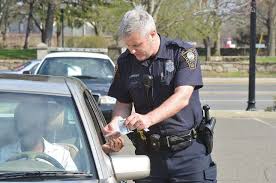It’s Friday! Tom was making his way home, looking forward to the weekend ahead. The pressure of the week behind him was fading as he made a mental list of his plans for the next couple of days. He’s finally free. As he turned a corner with his car, he turned a page in his mind to see sun, sand, water, fish…, but his thoughts are interrupted by a strange glow in his car. No, not really a glow, it was more like a flash. What is that pulsing orb of color? He suddenly recognizes the blue, pulsating flash of a police officer’s lights directly behind him. His stomach jumps to his throat as Tom glances down and notices his speedometer reading at 47. “It’s only 35 here”, Tom thinks to himself as he makes his way to the curb.
“Good afternoon, Sir. May I see your driver’s license?”, the officer asked politely. And you know how the rest of that conversation goes.
Why is the officer so polite? Why does he speak in such even tones, almost emotionless? Why doesn’t he charged up to Tom’s car, pound his fist on the hood, stomp his feet, kick the gravel and bellow something like, “What is the world are you doing? Are you some kind of jerk or something? What in the world do you think you’re doing, driving 47 miles an hour on my street?”
An officer doesn’t do that, because he’s been trained. He knows that the badge behind which he stands represents authority. It’s authority that he has been given. This is not a personal affront. The badge is not his, the street is not his, the law is not his. He is simply a representative a system that is much bigger than he is. He’s there under authority, having been sworn to protect, defend, and uphold. He doesn’t need to get angry. He doesn’t need to stomp and snort. His authority is expressed in the power of his pen, as he quietly, confidently, and firmly hands out a citation for speeding.
Tom finally makes it home. He walks to the door of his home, having already bathed his mind with visions of serenity, the aromas of supper, the splendor of loving children rushing to his knees. With his first step through the door, he feels the crushing, grinding sound of a Lego under his foot. Two of his precious children fly past him, as one screams, “Daddy, tell him to give that back to me!” The two continue their flight up the stairs as Tom slides past and into the kitchen, greets Linda, his wife. He quickly makes his way to the den, where he flops into his chair, flips open his laptop and fires up Candy Crush.
Now, it’s not that Tom is lazy. And it’s not that he doesn’t care about his wife, his children, or his home. Tom has not been trained or equipped. He does not know the “badge” that he has been given. He is not aware of the authority that is his. He doesn’t know how to issue citations or how to enforce them. Instead of quietly “asking for their license”, he is baffled, backs away, or gets angry.
In The Prince and the Pauper, Mark Twain tells the story of Prince Edward, son of King Henry VIII, who discovers that he has an identical look-alike in Tom Canty, a pauper who lives with his abusive father in Offal Court off Pudding Lane in London. Out of boredom and curiosity, the Prince develops a plan by which he trades places with the pauper. The Prince ends up locked out of his own kingdom, while the pauper is trapped in the strange and unfamiliar world of royalty. The confusion, distress, danger, and comedy that results are both entertaining and instructive. It’s a great story, but I’ll leave the reading to you.
The Prince’s decision does give us a good picture of what happens when lines of authority and responsibility are confused. I am convinced that if you as a man can come to understand and grab hold of your God-given position, it will change you forever. And along with changing you, it will change your wife. It will change your work-place. It will change your community. It will change your church. It will change our world.
Men, you have been given the right to oversee your home and family, to set direction, to determine beliefs, to decide what is taught and practiced. You have authority over the food you eat, what kind of house you live in, where that house is located, what income you earn. You get to decide what your children are taught and who teaches it.
Before I go further, please allow me to identify some ‘buzz’ words that push buttons in our culture. Where words such as ‘authority’, ‘obedience’ and ‘discipline’ were created by our Father in heaven, the enemy of man has twisted and perverted these words to keep us away from experiencing love. In the world, ‘authority’ is viewed as evil. ‘Obedience’ is seen as harsh and oppressive. ‘Honor’ and ‘Respect’ are seen as forced allegiance to undeserving tyrants. Please, please hear me on this. In their appropriate and original context, these words and the principles behind them are life giving. For the individual who walks willingly under the authority of the law, there is life, peace, protection, freedom to excel. Self-administered obedience (self-discipline) brings freedom from chaos, stability, confidence, peace and hope. Honor and respect simply identify tools by which I demonstrate value in people around me.
Words are the very thing that formed the universe, which is why a lack of understanding of these words keeps a man from walking in his rightful role. It is the understanding of leadership through love that positions a man to lead and influence his home, and the marketplace.
Authority, like life itself, however, cannot spring from nothing. Authority must be delegated from a higher source. The individual or entity that stands on its own and claims to have authority has no basis. The police officer who pulled Tom over for speeding gets his authority to do so from the civil authority that enacted the law that governs speed limits. The law makers that passed the speeding law gained their authority to do so from the documents that constitute the state that they govern. Those documents gain their authority from the Constitutional law under which our nation is established. The Constitution gains its authority from the Founder who established all law. Ultimately, all authority comes down from God himself. There is no authority, except that which comes from him.
There was a man in the Bible who was described, by Jesus, as having the greatest faith he had ever seen! He was a Roman centurion who said, “For I too am a man set under authority, with soldiers under me: and I say to one, ‘Go,’ and he goes; and to another, ‘Come,’ and he comes; and to my servant, ‘Do this,’ and he does it” Luke 7:8. Because the centurion had such understanding of authority, Jesus “marveled at him, and turning to the crowd that followed him, said, “I tell you, not even in Israel have I found such faith.” It’s amazing to consider that of all actions or statements that Jesus observed as he walked on earth, the one that receives his highest commendation is a man who understands authority.
Authority is a powerful tool. You have been empowered to train your sons and daughters in the appropriate use of their own authority. They have the privilege of making life choices for themselves. Equip them to make good choices. Many of life’s biggest decisions are made between the ages of 16 and 22; sexual choices, marriage choices, educational choices, vocational choices, indebtedness choices.
Teach your children to respect authority and to show honor. From the earliest age, let them know that there is authoritative structure in the world and they must comply with that authority. When your children are disobedient and resist your authority, take quick action, without emotion. Just like the police officer that pulled Tom over for speeding, speak quietly, respectfully. Explain the violation clearly, and “write a ticket”. Yes, that means there should be a penalty for disobedience.
Your child needs to be prepared for reality. Every sphere of life carries a penalty for disobedience. Tom felt that penalty for speeding. An employee loses his job for it. An athlete is penalized for it. In your family, your children need to be impacted by it.
I am a strong proponent of spanking young children. When done appropriately, it doesn’t happen often. Please understand and remember the context. Spank under control and without emotion. Spank for defiance and not for accidents. Communicate clearly and take action quickly, to avoid frustration and actions that are taken in anger. Discipline for heart compliance and not just for outward conformity.
I want to encourage you to start early, pray consistently, talk openly. Step forward and take daily action to reap the long-term fruit of maturity, wisdom, and freedom in the lives of your children.







